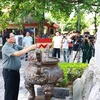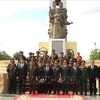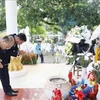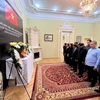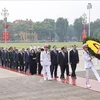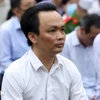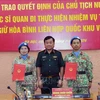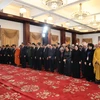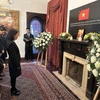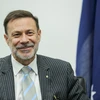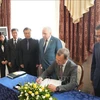A severe organ donor shortage in Vietnam means that few patients receive much-needed transplants.
Phan Van Bau, director of People's Hospital 115 in Ho Chi Minh City, said that 500 patients needed hemodialysis due to serious kidney decline. However, the hospital's 60 machines could not treat them all, even when operating at full capacity.
During the past 10 years, the hospital conducted barely 60 kidney transplant surgeries, as few people agreed to donate their kidneys. This reflects a nationwide problem. The country has 13 kidney transplant centres, but only about 500 people have received the surgery in the past two decades.
Associate professor Tran Ngoc Sinh, head of the Cho Ray Hospital's Urology Ward, said that thousands of patients needed hemodialysis and 100 were waiting for donated kidneys, yet few people were willing to donate organs.
More than 72,000 people in the country suffer from kidney decline and 6,000 need kidney transplants, while 5,000 need cornea transplants and thousands need liver transplants, according to the Ministry of Health.
Every year more than 10,000 people across the country die in traffic accidents, according to the National Traffic Safety Committee. HCM City's Cho Ray Hospital alone sees 1,000-1,500 brain death and head trauma victims every year, and the Viet Nam-Germany Hospital in Hanoi cited similar statistics.
If one person agrees to donate his or her organs, four or five lives can be saved. However, few families of brain-dead individuals agree to make the donation, often for spiritual reasons.
Associate professor Ha Phan Hai An, head of the Vietnam-Germany Hospital's Kidney and Blood Filtration Ward, said that organ transplants in Vietnam were cheaper than elsewhere in the world, but the cost – hundreds of millions of dong –was still too high for most citizens.
Moreover, after the transplant, patients must use medicines that cost millions of dong per month for the rest of their lives.
The National Centre for Co-ordinating Human Organ Transplants, the first of its kind in the country, was founded at the Vietnam-Germany Hospital in June last year following Prime Minister Nguyen Tan Dung's Decision 2002/QD-TTg.
The centre will make a list of people needing organ transplants, co-ordinate with hospitals and medical stations across the country to create an organ bank, call for organ donors and install a management system with information technology.
"The most important task is for hospitals and medical stations to convince people that organ donation can save lives," said An.-VNA
Phan Van Bau, director of People's Hospital 115 in Ho Chi Minh City, said that 500 patients needed hemodialysis due to serious kidney decline. However, the hospital's 60 machines could not treat them all, even when operating at full capacity.
During the past 10 years, the hospital conducted barely 60 kidney transplant surgeries, as few people agreed to donate their kidneys. This reflects a nationwide problem. The country has 13 kidney transplant centres, but only about 500 people have received the surgery in the past two decades.
Associate professor Tran Ngoc Sinh, head of the Cho Ray Hospital's Urology Ward, said that thousands of patients needed hemodialysis and 100 were waiting for donated kidneys, yet few people were willing to donate organs.
More than 72,000 people in the country suffer from kidney decline and 6,000 need kidney transplants, while 5,000 need cornea transplants and thousands need liver transplants, according to the Ministry of Health.
Every year more than 10,000 people across the country die in traffic accidents, according to the National Traffic Safety Committee. HCM City's Cho Ray Hospital alone sees 1,000-1,500 brain death and head trauma victims every year, and the Viet Nam-Germany Hospital in Hanoi cited similar statistics.
If one person agrees to donate his or her organs, four or five lives can be saved. However, few families of brain-dead individuals agree to make the donation, often for spiritual reasons.
Associate professor Ha Phan Hai An, head of the Vietnam-Germany Hospital's Kidney and Blood Filtration Ward, said that organ transplants in Vietnam were cheaper than elsewhere in the world, but the cost – hundreds of millions of dong –was still too high for most citizens.
Moreover, after the transplant, patients must use medicines that cost millions of dong per month for the rest of their lives.
The National Centre for Co-ordinating Human Organ Transplants, the first of its kind in the country, was founded at the Vietnam-Germany Hospital in June last year following Prime Minister Nguyen Tan Dung's Decision 2002/QD-TTg.
The centre will make a list of people needing organ transplants, co-ordinate with hospitals and medical stations across the country to create an organ bank, call for organ donors and install a management system with information technology.
"The most important task is for hospitals and medical stations to convince people that organ donation can save lives," said An.-VNA
